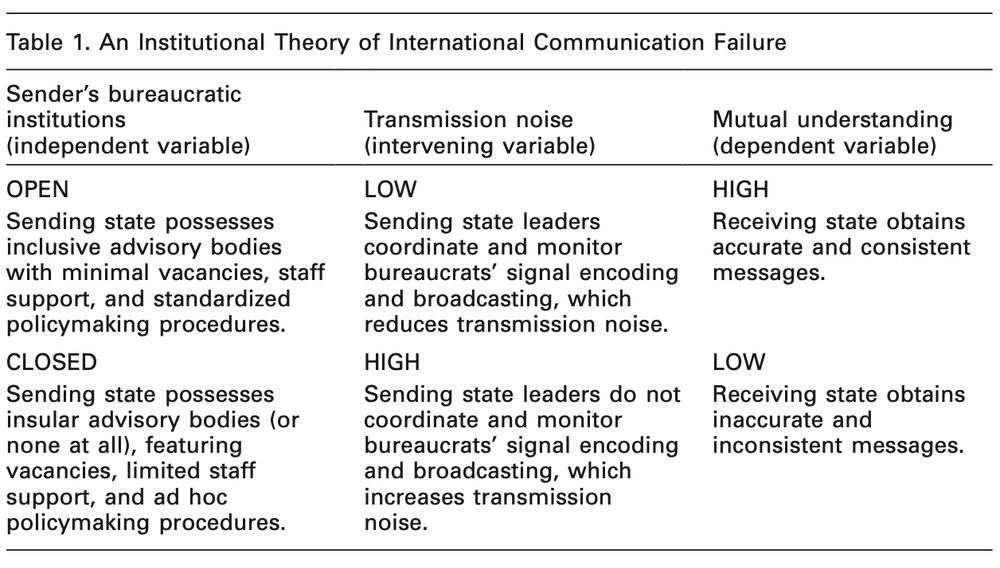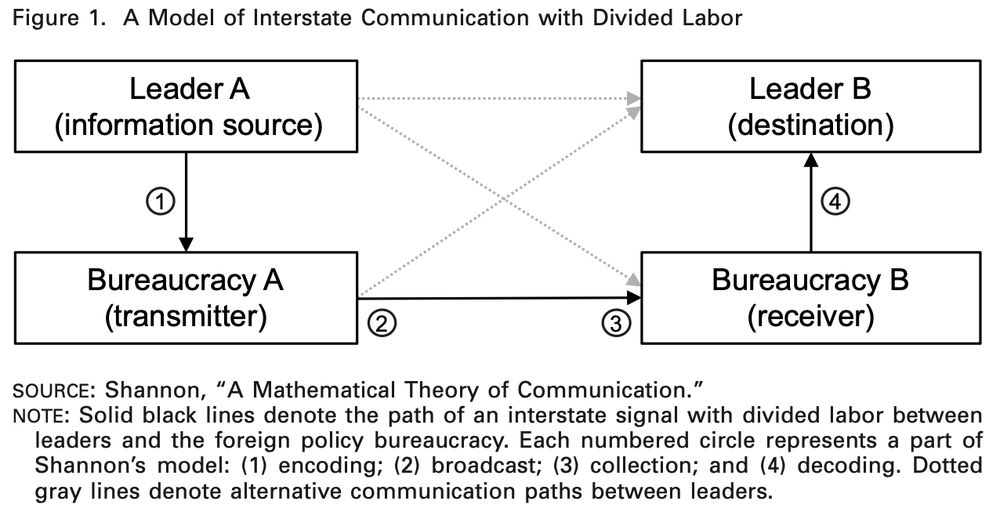Don Casler
@doncasler.bsky.social
Assistant professor of political science @University of Illinois at Urbana-Champaign | Former fellow @WatsonInstitute, @ND_ISC | IR, bureaucracies, political psychology, public opinion | @Columbia PhD | @Dartmouth '14
We're grateful to so many colleagues for their feedback, as well as to the anonymous reviewers and the stellar editorial team at IS.
May 14, 2025 at 4:20 PM
We're grateful to so many colleagues for their feedback, as well as to the anonymous reviewers and the stellar editorial team at IS.
For policymakers, our findings emphasize the importance of institutional quality. The future of effective diplomacy between Washington and Beijing or Delhi and Islamabad may hinge whether leaders can implement institutional structures that minimize noise.
May 14, 2025 at 4:20 PM
For policymakers, our findings emphasize the importance of institutional quality. The future of effective diplomacy between Washington and Beijing or Delhi and Islamabad may hinge whether leaders can implement institutional structures that minimize noise.
They also have key implications for the study of war more generally, as the noisiness of senders’ signals can increase the odds of incomplete information and miscalculation for receivers.
May 14, 2025 at 4:19 PM
They also have key implications for the study of war more generally, as the noisiness of senders’ signals can increase the odds of incomplete information and miscalculation for receivers.
Our findings illuminate a new and underappreciated way that interstate communication breaks down: when senders introduce transmission noise via institutional pathologies.
May 14, 2025 at 4:18 PM
Our findings illuminate a new and underappreciated way that interstate communication breaks down: when senders introduce transmission noise via institutional pathologies.
By contrast, India’s reformed institutions minimized noise during negotiations that followed the 1965 Indo-Pakistani War, setting conditions for mutual understanding at the Tashkent summit.
May 14, 2025 at 4:18 PM
By contrast, India’s reformed institutions minimized noise during negotiations that followed the 1965 Indo-Pakistani War, setting conditions for mutual understanding at the Tashkent summit.
Before the 1962 Sino-Indian War, India’s closed institutions produced ample transmission noise, creating misunderstanding during negotiations with China.
May 14, 2025 at 4:18 PM
Before the 1962 Sino-Indian War, India’s closed institutions produced ample transmission noise, creating misunderstanding during negotiations with China.
After measuring India’s institutional structure, we apply process tracing to a rich set of primary source documents, drawn from six countries, which allow us to reconstruct how a given signal transited the communication channel.
May 14, 2025 at 4:18 PM
After measuring India’s institutional structure, we apply process tracing to a rich set of primary source documents, drawn from six countries, which allow us to reconstruct how a given signal transited the communication channel.
To illustrate, we compare signal transmission processes from a single sender — India — before and after major institutional reforms in the mid-1960s. This provides analytic leverage to assess how institutions affect transmission noise, all else equal.
May 14, 2025 at 4:18 PM
To illustrate, we compare signal transmission processes from a single sender — India — before and after major institutional reforms in the mid-1960s. This provides analytic leverage to assess how institutions affect transmission noise, all else equal.
Different kinds of bureaucratic institutions are associated with different levels of transmission noise. Open institutions, which regularly connect leaders and bureaucrats, reduce noise. Closed institutions, which impede leader-bureaucrat information flow, increase noise.

May 14, 2025 at 4:18 PM
Different kinds of bureaucratic institutions are associated with different levels of transmission noise. Open institutions, which regularly connect leaders and bureaucrats, reduce noise. Closed institutions, which impede leader-bureaucrat information flow, increase noise.
States' bureaucratic institutions shape the noisiness of interstate communication. Drawing on information theory, we suggest that the division of labor within states — between bureaucrats and leaders — creates transmission noise, corrupting signals before they reach receivers.

May 14, 2025 at 4:17 PM
States' bureaucratic institutions shape the noisiness of interstate communication. Drawing on information theory, we suggest that the division of labor within states — between bureaucrats and leaders — creates transmission noise, corrupting signals before they reach receivers.
Yet there are many cases of communication failure in which senders were perceived as sincere and receivers processed signals effectively. Why did communication still fail in these instances? In short, because communication BETWEEN states is a function of institutions WITHIN them.
May 14, 2025 at 4:17 PM
Yet there are many cases of communication failure in which senders were perceived as sincere and receivers processed signals effectively. Why did communication still fail in these instances? In short, because communication BETWEEN states is a function of institutions WITHIN them.
Another is about misperception — when states send signals, they often can't account for biases in how receivers process information or make decisions. books.google.com/books?hl=en&...

Perception and Misperception in International Politics
Since its original publication in 1976, Perception and Misperception in International Politics has become a landmark book in its field, hailed by the New York Times as "the seminal statement of princi...
books.google.com
May 14, 2025 at 4:17 PM
Another is about misperception — when states send signals, they often can't account for biases in how receivers process information or make decisions. books.google.com/books?hl=en&...
We generally think communication fails for two reasons. One is about insincerity — when states send signals, they often misrepresent their bargaining position to get the best deal, so receivers of these signals doubt whether the sender is being truthful. academic.oup.com/isq/article-...

The Personal Touch: Leaders’ Impressions, Costly Signaling, and Assessments of Sincerity in International Affairs1
Abstract. What counts as evidence that the other side is sincere? Within mainstream international relations literature, scholars have focused on costly sig
academic.oup.com
May 14, 2025 at 4:16 PM
We generally think communication fails for two reasons. One is about insincerity — when states send signals, they often misrepresent their bargaining position to get the best deal, so receivers of these signals doubt whether the sender is being truthful. academic.oup.com/isq/article-...
Historically, communication failures have often pushed states down the road to conflict, perhaps most famously World War I and the Korean War www.degruyterbrill.com/document/doi...

China Crosses the Yalu
China Crosses the Yalu by Allen S. Whiting was published on November 25, 2021 by Stanford University Press.
www.degruyterbrill.com
May 14, 2025 at 4:16 PM
Historically, communication failures have often pushed states down the road to conflict, perhaps most famously World War I and the Korean War www.degruyterbrill.com/document/doi...

